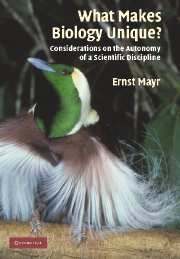Book contents
- Frontmatter
- Contents
- Preface
- Acknowledgments
- Introduction
- 1 Science and sciences
- 2 The autonomy of biology
- 3 Teleology
- 4 Analysis or reductionism?
- 5 Darwin's influence on modern thought
- 6 Darwin's five theories of evolution
- 7 Maturation of Darwinism
- 8 Selection
- 9 Do Thomas Kuhn's scientific revolutions take place?
- 10 Another look at the species problem
- 11 The origin of humans
- 12 Are we alone in this vast universe?
- Glossary
- Index
- References
5 - Darwin's influence on modern thought
Published online by Cambridge University Press: 10 December 2009
- Frontmatter
- Contents
- Preface
- Acknowledgments
- Introduction
- 1 Science and sciences
- 2 The autonomy of biology
- 3 Teleology
- 4 Analysis or reductionism?
- 5 Darwin's influence on modern thought
- 6 Darwin's five theories of evolution
- 7 Maturation of Darwinism
- 8 Selection
- 9 Do Thomas Kuhn's scientific revolutions take place?
- 10 Another look at the species problem
- 11 The origin of humans
- 12 Are we alone in this vast universe?
- Glossary
- Index
- References
Summary
Every period in the history of civilized humans was dominated by a definite set of ideas or ideologies. This is as true for the ancient Greeks as for Christianity, the Renaissance, the Scientific Revolution, the Enlightenment, and modern times. It is a challenging question to ask what the source is of the dominating ideas of the present era. One can ask this question also in different terms. For instance, which books have had the greatest impact on current thinking? Inevitably, the Bible would have to be mentioned in first place. Before 1989, when the bankruptcy of Marxism was declared, Karl Marx's Das Kapital would clearly have been in second place, and it is still a dominating influence in many parts of the world. Sigmund Freud has been in and out of favor. Albert Einstein's biographer Abraham Pais made the exuberant claim that Einstein's theories “have profoundly changed the way modern men and women think about the phenomena of inanimate nature.” No sooner had Pais said this, though, than he recognized the exaggeration. “It would actually be better to say ‘modern scientists’ than ‘modern men and woman,’” he wrote, because one needs schooling in the physicalist style of thought and mathematical techniques to appreciate Einstein's contributions. Indeed I doubt that any of the great discoveries in the physics of the 1920s had any influence whatsoever on the thinking of the average person. However, the situation is different with Darwin's On the Origin of Species (1859).
- Type
- Chapter
- Information
- What Makes Biology Unique?Considerations on the Autonomy of a Scientific Discipline, pp. 83 - 96Publisher: Cambridge University PressPrint publication year: 2004



